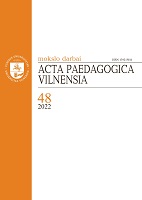E-Learning at the Tertiary Level in and After Pandemic
E-Learning at the Tertiary Level in and After Pandemic
Author(s): Liudmyla Holubnycha, Tetiana Besarab, Yana Pavlishcheva, Oksana Kadaner, Oksana KhodakovskaSubject(s): Foreign languages learning, Higher Education , Distance learning / e-learning, Pedagogy
Published by: Vilniaus Universiteto Leidykla
Keywords: Distance learning; University students; teaching English; higher school;
Summary/Abstract: The article deals with new challengers in higher education system in terms of reality caused by coronavirus COVID-19. Some positive experience in English distance teaching and learning (at the basis of Yaroslav Mudryi National Law University, Ukraine) is described as it is significant in pandemic and may become useful for post pandemic society to improve educational processes. The purpose of the paper is to share positive ideas for English elearning organization at the tertiary level in pandemic in order to use e-learning gains in further educational practice, highlight and solve its problems. General theoretical methods (analysis and synthesis) as well as empirical (observation and discussion) helped to find out advantages and identify disadvantages of the issue under study. The study has reached the following conclusions: asynchronous distance learning is effective for highly motivated students; synchronous forms demonstrate ability for developing all kinds of language skills. Advantages of distance teaching and learning there are: opportunity to display necessary didactic material on screen, to play audio recording or video materials for students in better quality. We have identified these problems: necessity of strong students’ motivation, connected with self-organization and the ability to work independently; sometimes insufficient technical skills of academic staff; academic dishonesty, which leads to meaninglessness of testing.
Journal: Acta Paedagogica Vilnensia
- Issue Year: 2022
- Issue No: 48
- Page Range: 47-60
- Page Count: 14
- Language: English

